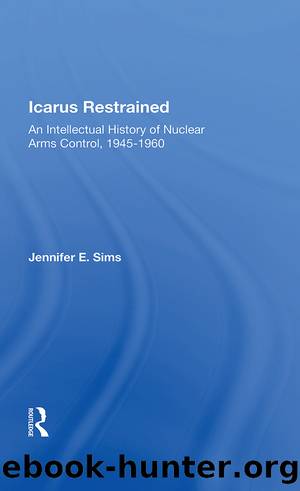Icarus Restrained: An Intellectual History of Nuclear Arms Control, 1945-1960 by Jennifer Sims

Author:Jennifer Sims [Sims, Jennifer]
Language: eng
Format: epub
Tags: International Relations, Political Science, General
ISBN: 9780429713835
Google: Q7uZDwAAQBAJ
Goodreads: 45913876
Publisher: Routledge
Published: 2019-04-18T00:00:00+00:00
Shils went on to argue that good arms policy not only had to be morally sound and politically useful, it had to be practical. The bomb had to be systematically taken into account in defense and foreign policy. If the United States was to pursue a policy of containment (which he personally opposed) it had to recognize that the likelihood of future friction with the Soviets would increaseâespecially in peripheral areas where social and economic conditions give rise to political instabilities. Since the American atomic monopoly would give way to a nuclear arms race, the result of containment would be an increase in the likelihood of atomic war.
Shils recommended three basic steps towards a more effective security policy: first, the Soviets had to be instructed about the bombâs tremendous force since their policies suggested naivete in this regard. Second, both governments should seek arms agreements outside the United Nations if necessary. Towards this end, Washington and Moscow should establish direct channels of communication. Third, the United States should recognize that containment is a military policy only in the last resort. It is primarily a political policy with social, psychological and economic requirements for success. Therefore, the United States should be prepared to devote substantial resources to the strengthening of peripheral areas through foreign aid.
With these recommendations, Shils made a strong case for integrating arms control and defense planning in a manner that was not to be practiced for another decade. The bipolar context was not only recognized, it was regarded as necessitating a bilateral solution to the problem of avoiding nuclear war. Although Shils lamented the lack of consideration of Soviet views in American arms control planning, his effort to fill this analytic gap exposed the rationalist bias which he shared with his predecessors as well as with some of the later Cambridge School. For Shils believed that the Sovietsâ failure to see what Americans saw in the bomb was primarily due to ignorance regarding the facts as opposed to calculated self-interest, and that one of arms controlâs useful bilateral functions would be to teach the adversary the wisdom of American military perspectives.
Download
This site does not store any files on its server. We only index and link to content provided by other sites. Please contact the content providers to delete copyright contents if any and email us, we'll remove relevant links or contents immediately.
Spell It Out by David Crystal(36110)
Life for Me Ain't Been No Crystal Stair by Susan Sheehan(35804)
Cecilia; Or, Memoirs of an Heiress — Volume 1 by Fanny Burney(32547)
Cecilia; Or, Memoirs of an Heiress — Volume 2 by Fanny Burney(31945)
Cecilia; Or, Memoirs of an Heiress — Volume 3 by Fanny Burney(31931)
The Great Music City by Andrea Baker(31917)
Professional Troublemaker by Luvvie Ajayi Jones(29651)
The Secret History by Donna Tartt(19053)
We're Going to Need More Wine by Gabrielle Union(19034)
Twilight of the Idols With the Antichrist and Ecce Homo by Friedrich Nietzsche(18622)
All the Missing Girls by Megan Miranda(15958)
Cat's cradle by Kurt Vonnegut(15335)
Pimp by Iceberg Slim(14488)
Bombshells: Glamour Girls of a Lifetime by Sullivan Steve(14057)
For the Love of Europe by Rick Steves(13912)
Talking to Strangers by Malcolm Gladwell(13349)
Norse Mythology by Gaiman Neil(13348)
Fifty Shades Freed by E L James(13232)
The Social Justice Warrior Handbook by Lisa De Pasquale(12187)
